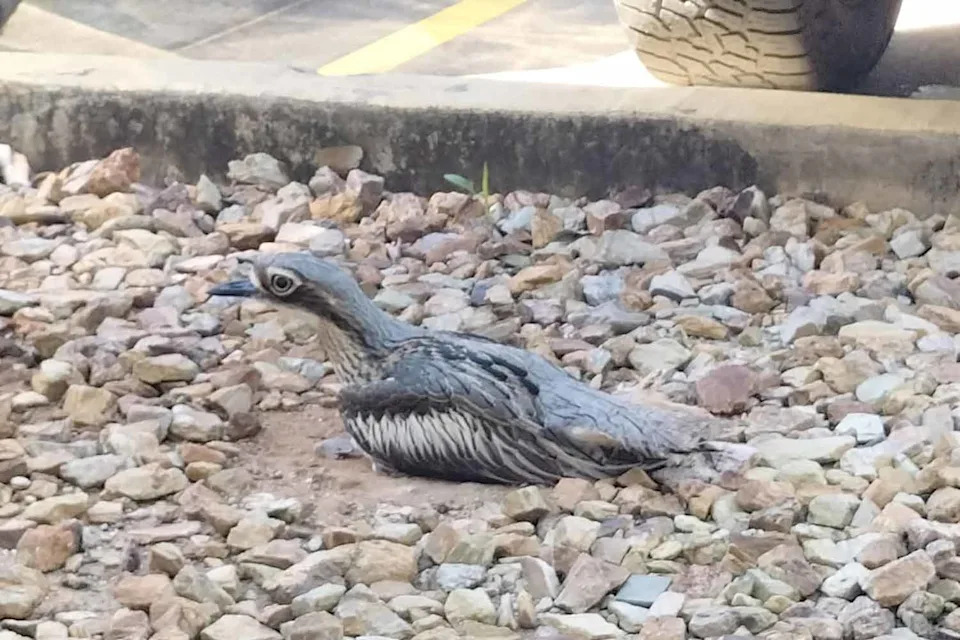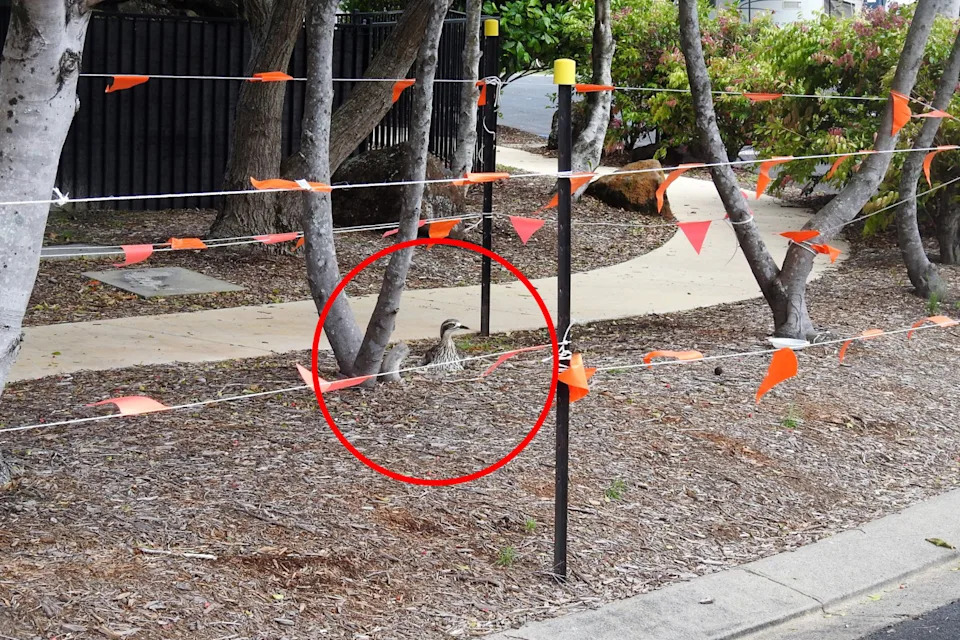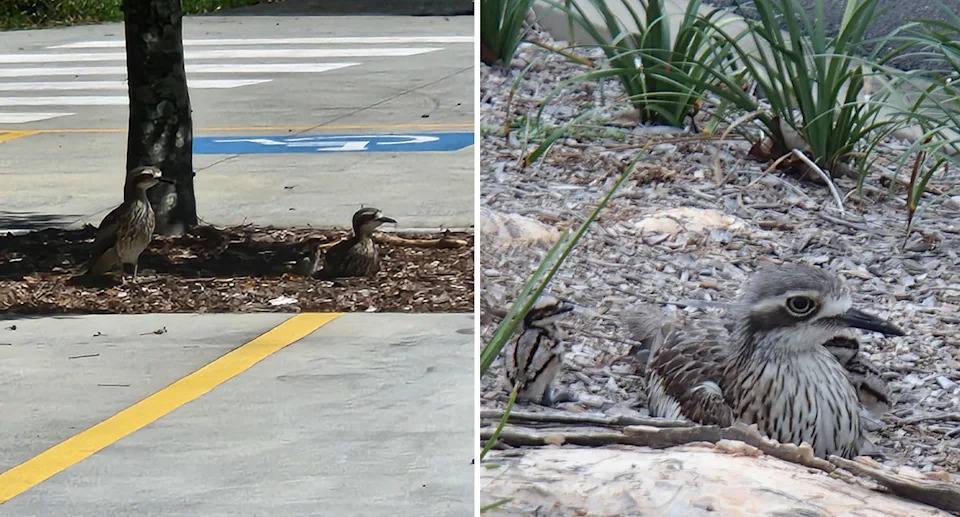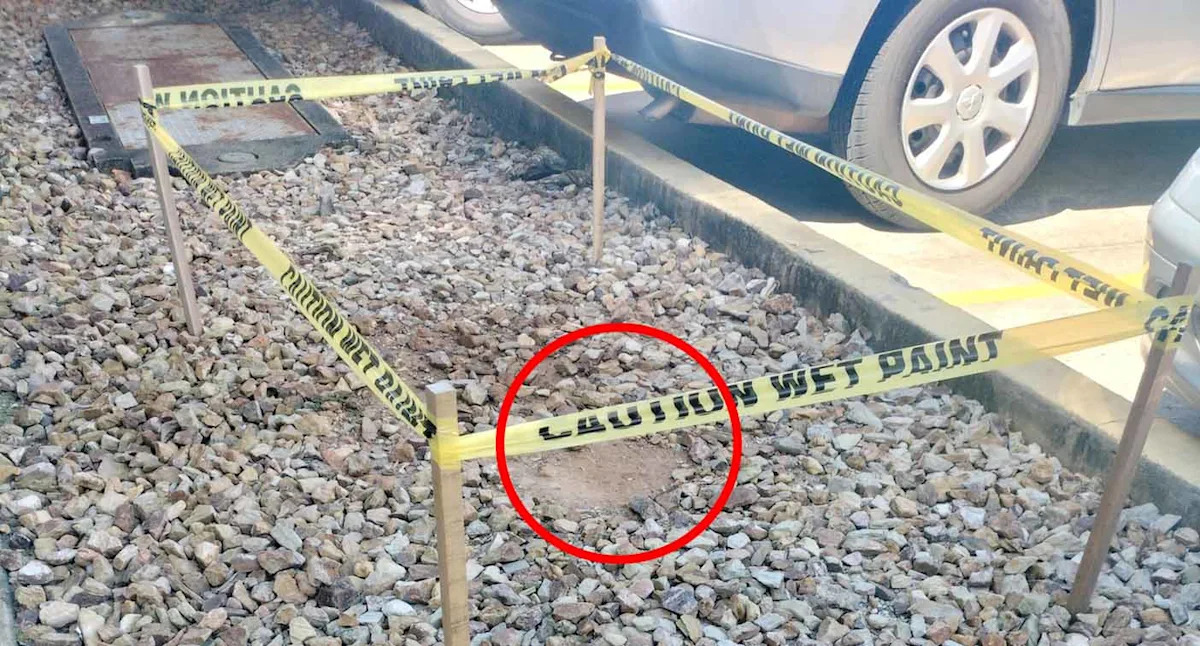Australians are being reminded to “take extra care” where they step after workers at a dental clinic made a sad discovery in the car park outside the practice.
Dental receptionist Alana Taylor told Yahoo News that a precious egg laid in a car park in Cleveland, in Brisbane’s southeast, by a bush stone-curlew had been trampled on this morning. That is, despite her best efforts to protect the nest with wooden stakes and caution tape.
“We’ve had some really bad news,” she told Yahoo News. “Someone stepped on the egg.” It’s not clear if the egg being crushed was on purpose or an accident, but Alana described the update as “sad”.
The development comes just days after Alana posted on a local social media page asking residents for advice. “Don’t want to see any harm to this beautiful mum and her baby,” she said.
Local rescue group Wildlife Rescue in Redlands told the receptionist to “place a barricade with tape and stakes so that people are aware and can stay away”, which Alana dutifully did. Sadly, it wasn’t enough to stop someone from crushing the delicate egg.
Wildlife rescuer Lucia told Yahoo News it’s “always heartbreaking” when a curlew egg is lost.
“While they are relatively common across Brisbane, every egg is precious. These birds already face challenges from cars, dogs, cats, and habitat loss, so seeing an egg destroyed is very sad, especially when a caring community member had tried to protect it,” she said.

The adult bush stone-curlew was spotted sitting on its nest before the egg was later crushed. Source: Facebook/Alana Taylor
Aussies urged to ‘keep an eye out’ for bush stone-curlew nests
The iconic birds are well known for their inconveniently placed nesting sites, including car parks, schools, workplaces, hospitals and even caravan parks.
Amy Nicholls, Sustainability and Environment Project Officer from Tweed Shire Council, previously told Yahoo News that it’s incorrect to call the birds “stupid” for doing so because they’ve simply adapted well to an increasingly urbanised environment.
The birds tend to prefer wide open spaces where they can spot predators from a distance.

Bush stone curlew nesting at Boyds Bay Holiday Park further down the coast at Tweed Heads. Source: Tweed Shire Council

The birds are well known for nesting in dangerous spots. Source: Tweed Shire Council
Curlews ‘don’t understand’ urban threats
Amy previously spoke to Yahoo urging people to “keep an eye out” for the birds that nest between the end of July and April. “They are well camouflaged,” she warned.
The birds nest in pairs and “share the workload” between them. This means one will sit on the nest to keep the egg at the right temperature while the other forages for food. This process is repeated for the 28-day incubation process.
When the chicks are young, “that is a very sensitive period”, Amy explained. “They don’t understand the threats of vehicles,” she explained, adding that they are especially hard to spot at night.
Numbers of bush stone-curlews remain strong in parts of Queensland and Northern Territory, but on the other side of the border in New South Wales, the story is completely different. The curlew is listed as an endangered species in NSW and Victoria, and threatened in South Australia
Following the incident in Cleveland, Alana urged fellow residents to “just be careful” where they step during nesting season. “We need to protect our wildlife,” she said.
Her words were echoed by Lucia, who urged Aussies to “give them space” and “create awareness.”
“You are generally not allowed to move a curlew nest, as they are a protected species, and disturbing them is illegal,” she warned.
“The only exceptions are if the nest is still under construction (no eggs) or if it is in a genuinely dangerous location, but even then, you should contact wildlife authorities for guidance.
“The best way we can help is by giving them space, keeping pets restrained, and raising awareness so fewer eggs are lost to accidents.”
Do you have a story tip? Email: newsroomau@yahoonews.com.
You can also follow us on Facebook, Instagram, TikTok, Twitter and YouTube.


